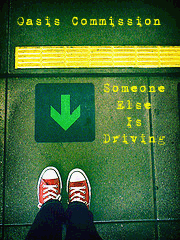I'm finally getting caught up on things, more or less - a bunch of journal editing duty fell out of the sky on my lap this weekend which is interesting because it's in my area and because the scholarship comes largely from outside the country but which is a problem because the scholarship is all being translated into English, making for loads of proof-reading difficulty. But it feels like I'm nearing the end of the stack of things for a bit, particularly as the department's big day o' celebration is coming up at the end of this week (about a month earlier than usual). And because my part of the candidate/hiring stuff here is at its end.
It's the end of the hiring process that has me thinking. I was pouring through my notes on the various teaching demonstrations, which has led me to drawing out particular themes and comments. As a note taker, I'm all over the place; words literally bend in different directions, arrows are drawn, and things are put into boxes. I'm not above drawing a picture of something unrelated if it comes to mind in hopes that some other pattern or problem is resolving itself. That makes going through notes doubly useful for me.
But the goal of this was to make sense of the hiring process here in order to see where I most wanted to cast my vote. The 30-second backdrop for all of this is that we're hiring, and as a group we committed to finding a way to make the department more diverse, though we've all got our own versions of what that means, mine obviously being the one closest to articulated here (if you want to get up to speed on the posts of my thoughts on this, it covers a bit of space and context: so look
here first and
here, maybe
here, then
here).
And in the midst of my notes, I stumbled across
this post by Dr. Crazy, and that, combined with things I stumbled across in the margins of my notes on candidate teaching presentations, made me think that the post you're currently reading might be a good idea.
Some caveats to where I'm going:
- first, this isn't the most well-thought out of posts; as usual, I'm still working out what it all means
- second, I'm likely to reference some other blog posts and arguments from here and there, but I don't mean to represent what they're talking about so much as what they made me think about.
Dr. Crazy's post had me thinking about what I'd already been doing in my own evaluations of candidates: playing a peculiar form of identity politics. It was good to ready Crazy's post because it put words to things I'd noticed but hadn't seen articulated. But it managed to (virtually) put boot to butt - or perhaps just a big red crayon underline - to things I'd be considering.
So what did I stumble across in my notes? In one candidate's review, noting their teaching style and how it wasn't connecting with our students, I wrote:
"Needs to risk something"
and in another, later candidate's notes, who also had a note about needing to risk:
"is it fair to hire a candidate to bring a particular kind of diversity? --> is that making them a poster child?"
I'd been hoping at the beginning of the process (roughly represented in that first quote) that the candidates would bring difference into the classroom directly - that they'd draw on their experiences and difference to make the lecture work. But by the near end of it, when a candidate from a foreign country was speaking, I began to wonder about how fair what I was asking might be.
If I'm really going to be true to this line of thought, I'm going to have to divulge a bit. As I said, my department committed to hiring with diversity in relation to this position. I'm proud of that - that we didn't even have to talk about it, that it was on all of our minds. But where the latter parts of my notes seems to indicate that I'm starting to see some pitfalls. We need diversity here.
We NEED diversity here.
I'm in a department that is entirely white, entirely male at a university that is decidedly white and female in a region that is considerably more diverse than that. If we add categories - upbringing and religion, for example - things here get even more homogeneous. My connection to the students (in terms of demographics) comes largely from visible appearance and a similar background. I grew up working class, as most of the kids are here. I put myself through school, the same as most of the kids here. And that's largely where it ends.
If someone had said, in their hiring of me, that they were looking for diversity, would they have found it? And maybe more importantly, would they have found me risking anything when I stepped to the front of the room the way I seemed to expect these candidates to?
If you've ever come across those posts about the student exercise to demonstrate privilege (you know the one: take a step forward if your family had books when you were growing up), and you've seen the reaction that seems most common to it in the blog-o-sphere ("What? We had books growing up, and I don't think I was particularly privileged! This test is a sham!")*, you'll get a sense of how I'm starting to question my own hiring criteria. Am I setting someone up to stumble into the classroom situation Crazy mentions?
It felt like, as the last candidate was speaking, as I was silently urging her to risk something - and not just anything, but to put herself out there with a personal example of her difference - that what I was actually asking was for her to self-marginalize, that, in fact, her job might literally depend upon it. It's so tricky, because I do believe diversity is vital to education (not just the education at the institution I'm at). And I do believe that I bring a little of it myself.
But I also clearly bring it from a safer position. And I'm not sure how I should negotiate that.
_______
* It's not a predictor, people. It's an exercise. It isn't meant to test for some certainty of whether someone is privileged or not; it is a quick exercise to provide a simple reframing. It isn't meant to be exhaustive. I know that it's irritating to have stumbled across the academic version of "You might be a redneck if..." but I think if question one for whether you are privileged or not was "You have time to sit around and debate on the computer whether you're privileged or not," the debate would be both funnier and shorter.





